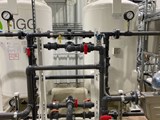Central Indiana & North West Ohio
Waste Water Treatment Plants
Oil and grease drip from automobiles and trucks and leave residues on garage floors. Most people just clean it up and wash it away. If this happed, at a pipeline pump station it becomes a major concern. One drop spilled is one drop too many. One way to mitigate this potential problem is to engineer a facility wide collection system or process sewer. Most refineries and chemical plants have internal process sewers to treat all surface water runoff.
Smaller facilities may not have these systems. They must find other solutions such as containment and treatment. This was the case in two facilities. One in Central Indiana and the other in Northwest Ohio. In each case the facility’s surface drained water into a sealed collection basin. The original designers built the basins to accommodate a maximum rainfall event. To ensure that zero contamination occurred the operator enhanced both facilities by engineering a treatment system that removed particulates and contamination. This treatment allowed the water to be discharged.
Midwestern Contractors won both contracts to build and commission the wastewater treatment plants. The project planning started by coordinating all material and equipment deliveries. The sites were laced with underground pipes, electric power cables and control wiring running in underground conduits. Hydro-excavation removed material from slot trenches and potholes by using water blasting and suction. Containments built on site for the slurry allowed for drainage and then proper disposal.
Hydro-excavation is time consuming, but it was the only safe way to remove material to a depth below the frost line, to pour the footers. Complicated forming and reinforcing rod placement created the shape of the foundation, collection troughs, and conduit runs. Successive pours then brought the foundation above grade where the steel erectors could begin their work.
Project Summary
Indiana Plant Ohio Plant Item
220 190 yd3 Concrete
800 1000 yd3 Material excavated
30 50 Tons of reinforcing rod
800 1000 Wiring
900 1200 Hours of concrete forming, pouring, finishing
500 700 Hours of steel erection
700 1000 Hours of pipe fitting
200 300 Hours of restoration
0 0 Safety incidents
The building frame, siding and roof went up quickly, then the erectors, fitters, and electricians began working on their parts of the project. Each plant would process almost one million gallons of water per year and had to function continuously. The wastewater moved through clay and carbon filter with pH metering and treatment to keep the desired pH value.
Electricians followed the complex drawings and built conduits from the motor control and switch panels out to the pumps and automated valves. Pulling power and control wires and terminating them in the panels, completed the job. Fitters installed the filtration tanks, valves, pumps, and sample ports. Submersible electric pumps installed in the primary sump were redundant. A large uninterruptable power supply provided emergency power if line power failed.
The commissioning process required evaluating every system and every configuration. Thanks to the skill of the engineers that designed and created the drawings, and the skill of the tradesmen that executed the plan, both plants came online smoothly and are processing close to 100,000 gallons of water per month, releasing clean water into the local drainage system.
Midwestern Contractors is a 70-year-old design/build contractor specializing in pipeline construction, compressor station construction, facilities maintenance, and integrity work. Midwestern Contractors serves the oil and gas industry in a service area extending from Nebraska to the east coast and south to Tennessee, Kentucky, and Missouri. Our employee/owners work diligently to produce quality work and perform it safely. The infrastructure we build will last for decades.




































